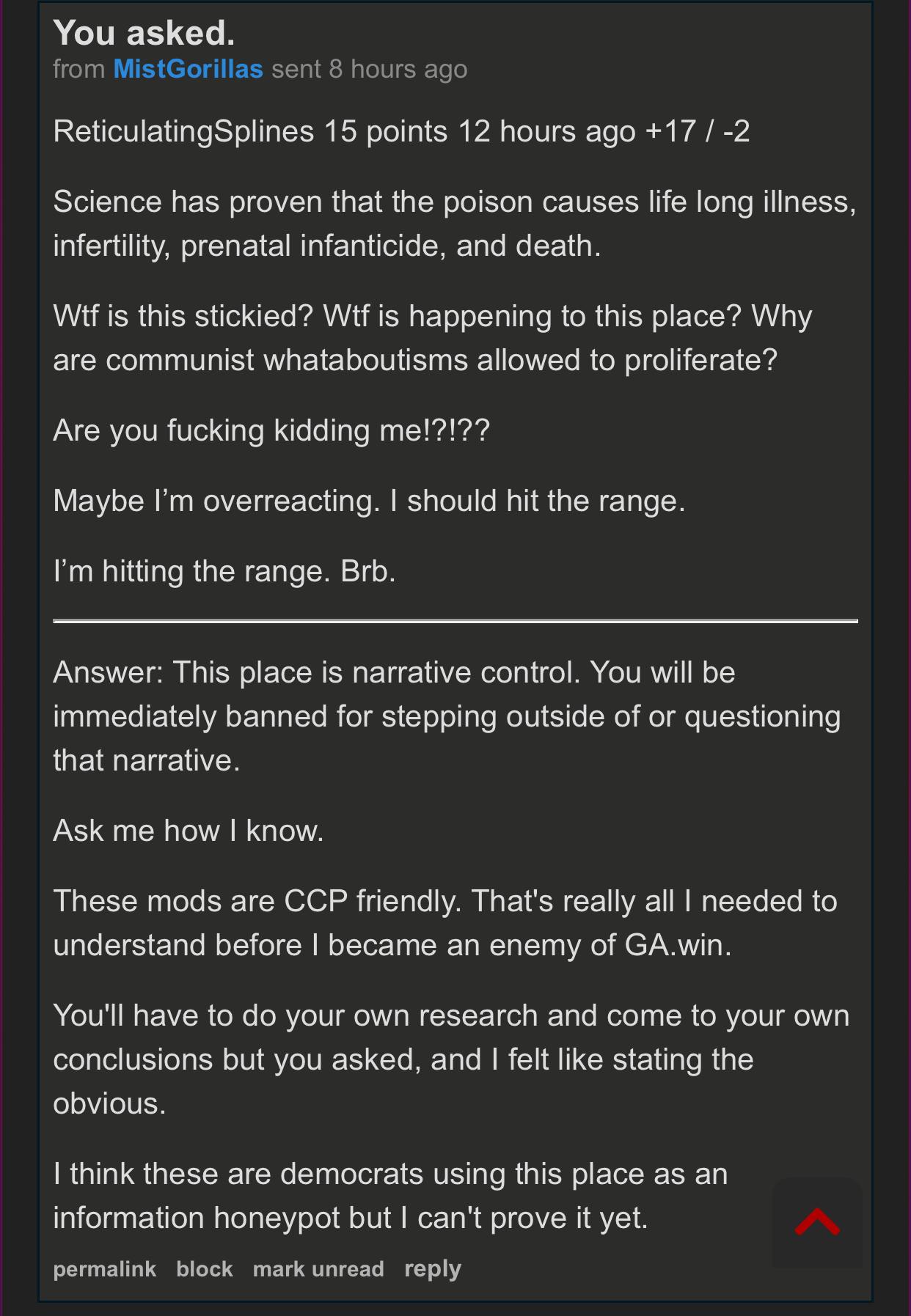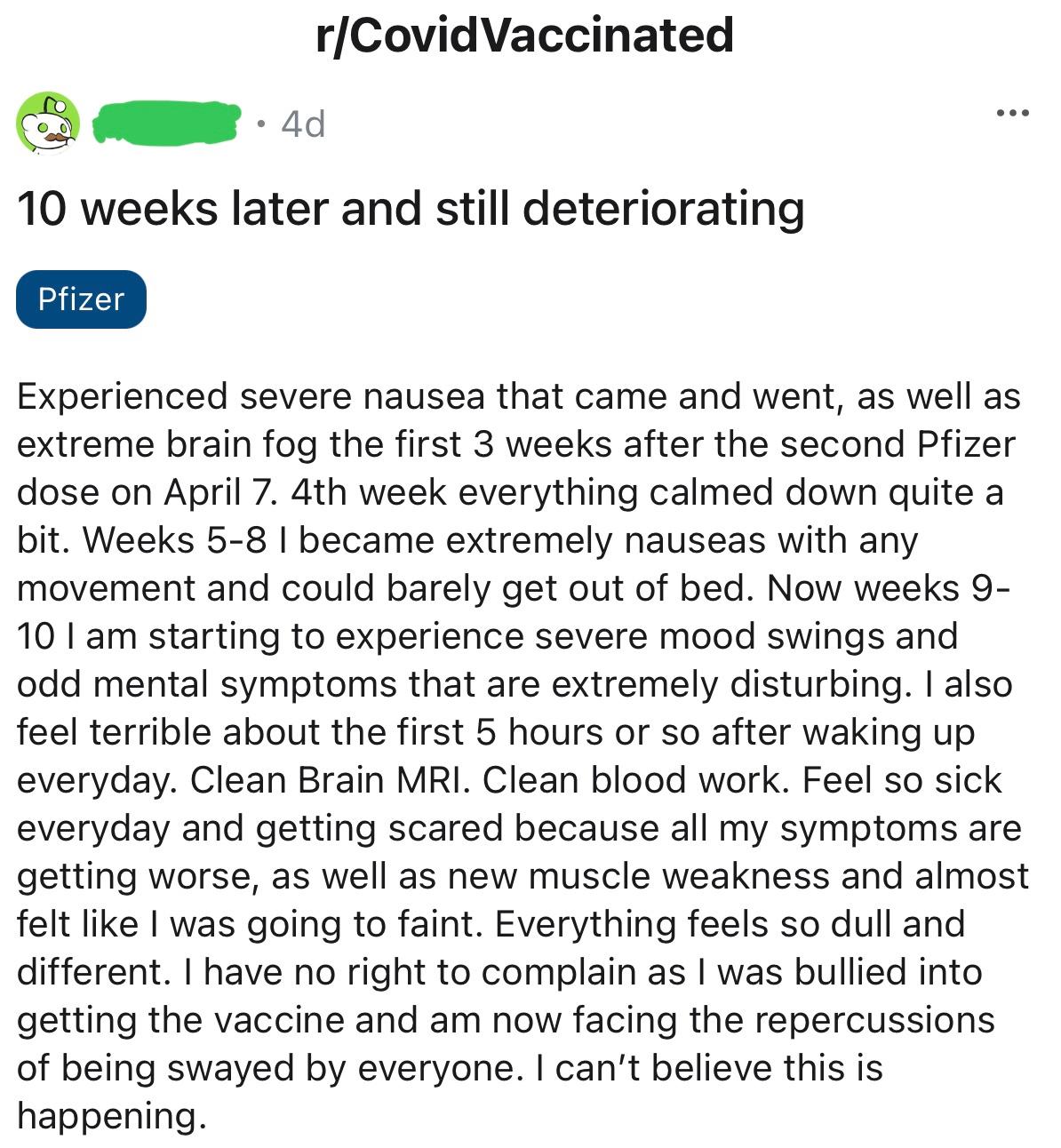You’re welcome:
https://www.ncbi.nlm.nih.gov/pmc/articles/PMC5835698/
“It has been used by millions of people around the world exhibiting a wide margin of clinical safety. In this review, we summarize the in vitro and in vivo evidences demonstrating that ivermectin exerts antitumor effects in different types of cancer. Ivermectin interacts with several targets including the multidrug resistance protein (MDR), the Akt/mTOR and WNT-TCF pathways, the purinergic receptors, PAK-1 protein, certain cancer-related epigenetic deregulators such as SIN3A and SIN3B, RNA helicase, chloride channel receptors and preferentially target cancer stem-cell like population.
Importantly, the in vitro and in vivo antitumor activities of ivermectin are achieved at concentrations that can be clinically reachable based on the human pharmacokinetic studies done in healthy and parasited patients. Thus, existing information on ivermectin could allow its rapid move into clinical trials for cancer patients.”
————
https://www.ncbi.nlm.nih.gov/pmc/articles/PMC7505114/
“Ivermectin has powerful antitumor effects, including the inhibition of proliferation, metastasis, and angiogenic activity, in a variety of cancer cells. This may be related to the regulation of multiple signaling pathways by ivermectin through PAK1 kinase. On the other hand, ivermectin promotes programmed cancer cell death, including apoptosis, autophagy and pyroptosis. Ivermectin induces apoptosis and autophagy is mutually regulated. Interestingly, ivermectin can also inhibit tumor stem cells and reverse multidrug resistance and exerts the optimal effect when used in combination with other chemotherapy drugs.”
————-
https://pubmed.ncbi.nlm.nih.gov/32549918/
“Ivermectin, as an old anti-parasite drug, can suppress almost completely the growth of various human cancers, including ovarian cancer (OC).”
————-
https://pubmed.ncbi.nlm.nih.gov/32533071/
“Ivermectin proposes many potentials effects to treat a range of diseases, with its antimicrobial, antiviral, and anti-cancer properties as a wonder drug. It is highly effective against many microorganisms including some viruses. In this comprehensive systematic review, antiviral effects of ivermectin are summarized including in vitro and in vivo studies over the past 50 years. Several studies reported antiviral effects of ivermectin on RNA viruses such as Zika, dengue, yellow fever, West Nile, Hendra, Newcastle, Venezuelan equine encephalitis, chikungunya, Semliki Forest, Sindbis, Avian influenza A, Porcine Reproductive and Respiratory Syndrome, Human immunodeficiency virus type 1, and severe acute respiratory syndrome coronavirus 2. Furthermore, there are some studies showing antiviral effects of ivermectin against DNA viruses such as Equine herpes type 1, BK polyomavirus, pseudorabies, porcine circovirus 2, and bovine herpesvirus 1. Ivermectin plays a role in several biological mechanisms, therefore it could serve as a potential candidate in the treatment of a wide range of viruses including COVID-19 as well as other types of positive-sense single-stranded RNA viruses.”
————-
https://clinicaltrials.gov/ct2/show/NCT04447235
“This is a randomized, doubled-blind and placebo-controlled phase II study that will evaluate the efficacy of the early use of ivermectin plus losartan in cancer patients who present with recent diagnosis of COVID-19.
The trial will enroll 176 patients with previous diagnosis of active cancer (88 in each arm) and the aim of the study is to assess the efficacy of these drugs combination to decrease the incidence of COVID-19 severe complications. Patients will receive single dose ivermectin of 12mg after the confirmed diagnosis of COVID-19, followed by 15 days of losartan.
We believe that the association of anti-viral activity of the ivermectin plus the extracellular blockade of the receptor used by the virus will decrease the overall viremia and subsequently improve clinical outcomes.”
————
“In our current study, we demonstrated that ivermectin displayed preclinical activity against hematologic malignancies in vitro and delayed tumor growth in vivo at concentrations that appear pharmacologically achievable. Mechanistically, ivermectin induced chloride influx, membrane hyperpolarization, and generated reactive oxygen species (ROS). Furthermore, ivermectin synergized with cytarabine and daunorubicin. Thus, given its prior safety and toxicity testing, ivermectin could be rapidly advanced into clinical trial for patients with leukemia.”
————
https://onlinelibrary.wiley.com/doi/10.1111/jcmm.15195
“Oesophageal squamous cell carcinoma (ESCC), the most common form of oesophageal malignancies in the Asia-Pacific region, remains a major clinical challenge. In this study, we found that ivermectin, an effective antiparasitic drug that has been approved for patients to orally treat onchocerciasis for over 30 years, displayed potent antitumour activity against ESCC cells in vitro and in nude mice. We demonstrated that ivermectin significantly inhibited cell viability and colony formation, and induced apoptosis through a mitochondrial-dependent manner in ESCC cells. Ivermectin also abrogated ESCC cell migration, invasion, as well as the protein levels of MMP-2 and MMP-9. Mechanistically, ivermectin strongly inhibited the expression of PAK1; by further gain- and loss-of-function experiments, we confirmed that PAK1 played a crucial role in ivermectin-mediated inhibitory effects on ESCC cells. In addition, the data indicated that ivermectin promoted PAK1 degradation through the proteasome-dependent pathway. Additionally, ivermectin synergized with chemotherapeutic drugs including cisplatin and 5-fluorouracil to induce apoptosis of ESCC cells. Interestingly, the in vivo experiments also confirmed that ivermectin effectively suppressed tumour growth and lung metastasis of ESCC. Collectively, these results indicate that ivermectin exerts a potent antitumour activity against ESCC and is a promising therapeutic candidate drug for ESCC patients, even those carrying metastasis.”
————
https://www.nature.com/articles/ja201711
“In human ovarian cancer and NF2 tumor cell lines, high-dose ivermectin inactivates protein kinase PAK1 and blocks PAK1-dependent growth. PAK proteins are essential for cytoskeletal reorganization and nuclear signaling, PAK1 being implicated in tumor genesis while inhibiting PAK1 signals induces tumor cell apoptosis (cell death).
PAK1 is essential for the growth of more than 70% of all human cancers, including breast, prostate, pancreatic, colon, gastric, lung, cervical and thyroid cancers, as well as hepatoma, glioma, melanoma, multiple myeloma and for neurofibromatosis tumors.110”
I believe it was during an interview when he explained the technique succinctly while talking about illegal spying against his campaign by the Manchurian “administration” that preceded his. He mentioned that he doesn’t do email and prefers to talk on the phone but always assumes there are third parties listening.
Please link if you find the clip.
Edit: He also alluded to the technique in an another interview while talking about the Ukraine phone call.


FUCKING HOLD, SOLDIER. Don’t you DARE give up now. There must be sacrifices. There must be casualties. We are in the crescendo.
KEEP THE FAITH. BE BASED AF.
DEPORT SHILLS TO HELL (reddit).
Don’t let the evil inside. Be based until the end.


Keeps me going, fam.


They are such faggots lol
A much better ratio of strong, healthy, patriotically minded Americans. Why is that so important?
We are at war.
As Yuri Bezmenov, the Soviet defector, advised us: the only way to solve the problem of rot from within is to dilute it out of the population. There are only two ways to do that and the “vax” does both.
4D chess like a mofo.
✝️

https://www.lifesitenews.com/opinion/lies-and-absurdities-that-damaged-the-covid-pandemic-response
Author:
“Paul Elias Alexander, PhD, has expertise in the teaching of epidemiology (clinical epidemiology), evidence-based medicine, and research methodology. He is a former professor at McMaster University in evidence-based medicine; former COVID pandemic advisor to WHO-PAHO in Washington, D.C. (2020); and a former senior advisor on COVID pandemic policy at the U.S. government’s Department of Health and Human Services (HHS) in Washington, D.C. He did graduate studies at the University of Oxford in England, the University of Toronto in Canada, McMaster University in Canada, and York University in Canada.”
Title.






